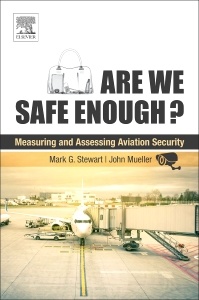Description
Are We Safe Enough?
Measuring and Assessing Aviation Security
Authors: Stewart Mark G., Mueller John
Language: English
Keywords
risk; terrorism; cost-benefit analysis; aviation; aviation security; airports
102.64 €
In Print (Delivery period: 14 days).
Add to cartSupport: Print on demand
Description
/li>Contents
/li>Biography
/li>Comment
/li>
Are We Safe Enough? Measuring and Assessing Aviation Security explains how standard risk analytic and cost-benefit analysis can be applied to aviation security in systematic and easy-to-understand steps. The book evaluates and puts into sensible context the risks associated with air travel, the risk appetite of airlines and regulators and the notion of acceptable risk. It does so by describing the effectiveness, risk reduction and cost of each layer of aviation security, from policing and intelligence to checkpoint passenger screening to arming pilots on the flight deck.
1. Introduction: Asking the Right Questions about Terrorism2. Evaluating Aviation Security3. Layers of Aviation Security: Examining their Individual Contribution to Risk Reduction4. Reducing Costs Without Reducing Security: Comparing the Value of Individual Layers5. Improving Checkpoint Efficiency, Evaluating PreCheck6. Policing and Protecting Airports7. Conclusion: Responsible counterterrorism policy-making
John Mueller is Woody Hayes Senior Research Scientist at the Mershon Center for International Security Studies and Professor of Political Science at Ohio State University, as well as a Senior Fellow at the Cato Institute. He is the author of over a dozen books, several of which have won prizes. Among the most recent of these: War and Ideas (2011) Atomic Obsession: Nuclear Alarmism from Hiroshima to Al-Qaeda (2010), Overblown (2006), and The Remnants of War (2004). He has also edited the web book, Terrorism Since 9/11: The American Cases (2017). Earlier books include Capitalism, Democracy, and Ralph’s Pretty Good Grocery, Retreat from Doomsday, Astaire Dancing, and War, Presidents and Public Opinion. He has published hundreds of articles in scholarly journals and general magazines and newspapers, is a member of the American Academy of Arts and Sciences, and has been a John Simon Guggenheim Fellow.
- Quantifies the risks, costs and benefits of various aviation security methods, including policing, intelligence, PreCheck, checkpoint passenger screening, behavioral detection, air marshals and armed pilots
- Focuses on security measures that reduce costs without reducing security, including PreCheck, Federal Flight Deck Officer program and Installed Physical Secondary Barriers
- Features risk-reduction insights with global applications that are fully transparent, and fully explored through sensitivity analysis




